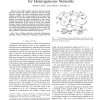Free Online Productivity Tools
i2Speak
i2Symbol
i2OCR
iTex2Img
iWeb2Print
iWeb2Shot
i2Type
iPdf2Split
iPdf2Merge
i2Bopomofo
i2Arabic
i2Style
i2Image
i2PDF
iLatex2Rtf
Sci2ools
INFOCOM
2005
IEEE
2005
IEEE
Fairness and optimal stochastic control for heterogeneous networks
— We consider optimal control for general networks with both wireless and wireline components and time varying channels. A dynamic strategy is developed to support all traffic whenever possible, and to make optimally fair decisions about which data to serve when inputs exceed network capacity. The strategy is decoupled into separate algorithms for flow control, routing, and resource allocation, and allows each user to make decisions independent of the actions of others. The combined strategy is shown to yield data rates that are arbitrarily close to the optimal operating point achieved when all network controllers are coordinated and have perfect knowledge of future events. The cost of approaching this fair operating point is an end-to-end delay increase for data that is served by the network.
| Added | 25 Jun 2010 |
| Updated | 25 Jun 2010 |
| Type | Conference |
| Year | 2005 |
| Where | INFOCOM |
| Authors | Michael J. Neely, Eytan Modiano, Chih-Ping Li |
Comments (0)

